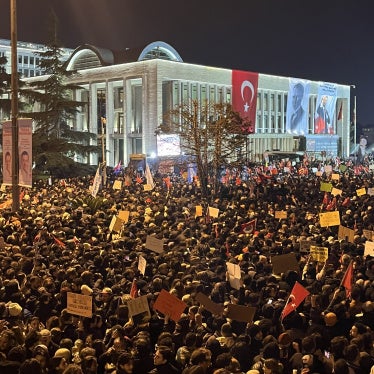(Moscow) – Millions of sports fans, members of the press, and policymakers across the globe now know how to find Sochi on the map. Russian authorities boast on the official website of the Games that “Sochi will become an example to other cities of Russia and the world. The Games in Sochi will leave behind an invaluable legacy, whose benefits will be utilized by Russian citizens long after the Games themselves become history.”
The Kremlin clearly hopes to boost Russia’s prestige as the host of a glorious international event. The face of the once quaint Black Sea resort is forever changed by the colossal pre-Olympic construction. It’s no wonder that Sochi now stands as the most expensive Games in history and that in addition to the monetary costs, there were major human costs involved. Russia’s preparations for the Games were marred by illegal exploitation, detentions, and deportations of migrant construction workers and forced evictions of Sochi residents without adequate – in some cases no – compensation to make way for Olympics infrastructure. Journalists and activists, who pointed to environmental damage and argued that the massive construction compromised the health, safety, and property of many Sochi residents were harassed and intimidated.
It is now clear that many parts of that legacy will not be positive. The country’s leadership is hiding the fact that some local residents actually view the Olympics as the ten plagues that have effectively ruined their lives.
Such was the case with the unfortunate people who happen to live in the village of Akhshtyr. Alexander Koropov, a middle-aged man who lived in the village all his life, told Human Rights Watch, “When it all started with the Olympics, we had all this hope.… Especially as the president said that no one would suffer any damage because of the construction, because of the work. But here it turns out that the whole village has suffered.”
With a few more than 150 residents, Akhshtyr is located in the Caucasus Mountains, between the Olympic venues on Sochi’s Black Sea coast and the alpine Olympic venues in the resort of Krasnaya Polyana. To link these venues, the authorities built a 48-kilometer railway and a highway. When this massive and mind-blowingly expensive project was completed, it had no entry or exit ramps to the highway – though the village lies practically next to it, and at least some early blueprints envisaged one.
The highway also cuts through a dirt road and path that once took adults and children from the village to the nearest road where transportation and school bus shuttles stop to take the commuters to work and to school. The authorities did not install a pedestrian crossing across the new highway, so there is no longer a safe way for the villagers to cross that road. As a result, Akhshtyr citizens have been largely cut off from public transportation and therefore from schools, clinics, and the like.
When researchers from Human Rights Watch came to Akhshtyr last year, the villagers sounded desperate. One woman said, “Since the beginning of the Olympisc construction [2008], the plight of our village has been dire. We became isolated from the entire civilized world. In the past, it took us around 25 minutes to get to the bus or the school shuttle. Now, it takes almost two hours.”
At the start of construction almost 6 years ago, the authorities created quarries and a huge garbage dump for construction waste just above Akhshtyr and paved the dirt road running through the village to enable trucks to access them. Akhshtyr residents have been driven to despair by all-pervasive dust and overwhelming noise from the construction traffic. Not only have they had to breathe dust for years, but it effectively destroyed their key source of income: growing and selling local produce. Peaches, figs, and persimmons are apparently less resilient than human beings – they’ve flatly refused to adjust to the hostile environment. One would want to think that now, when the construction is over, life would go back to normal. But in process of paving the road for the trucks, Akhshtyr’s natural water wells were destroyed.
Thanks to the Sochi Olympics, Akhshtyr’s families have now had no reliable access to water for more than five years. And residents cannot revive their gardens without being able to water them properly.
For several years now, the authorities have been delivering water to Akhshtyr by truck roughly once a week – though sometimes more than a week goes by in between water deliveries. This is barely enough for drinking, certainly not enough for cleaning and washing, and any use for gardening is unthinkable. And the villagers fear that once the Games are over the authorities will stop supplying the water altogether.
No wonder they are worried. Back in 2010, as a result of repeated complaints (including by Human Rights Watch directly to the International Olympic Committee) the authorities finally had a water pump installed in Akhshtyr. Residents were elated. A bunch of local government officials came to the village for a televised public event celebrating the pump’s installation. But that turned out to be the one and only day that the pump actually worked. The very next morning the residents found it had been shut off – because the water did not meet “sanitary protection norms” and firefighting requirements and did not pass the state inspection (as the officials helpfully informed the residents later on).
One might think – these are just some 150 villagers, and the Olympics competitions will be enjoyed by millions around the world. But at their best, the Olympics should celebrate human dignity and achievement, not victimize those closest to the Games.
It is a stain on the Sochi Games and should be an embarrassment to the International Olympic Committee that Russia is spending $51 billion dollars on the Olympics, yet will not install an operating water pump in this village. The people of Akhshtyr have suffered enough. They should also benefit from the Olympics coming to their region.
Originally published in Le Monde in French.









